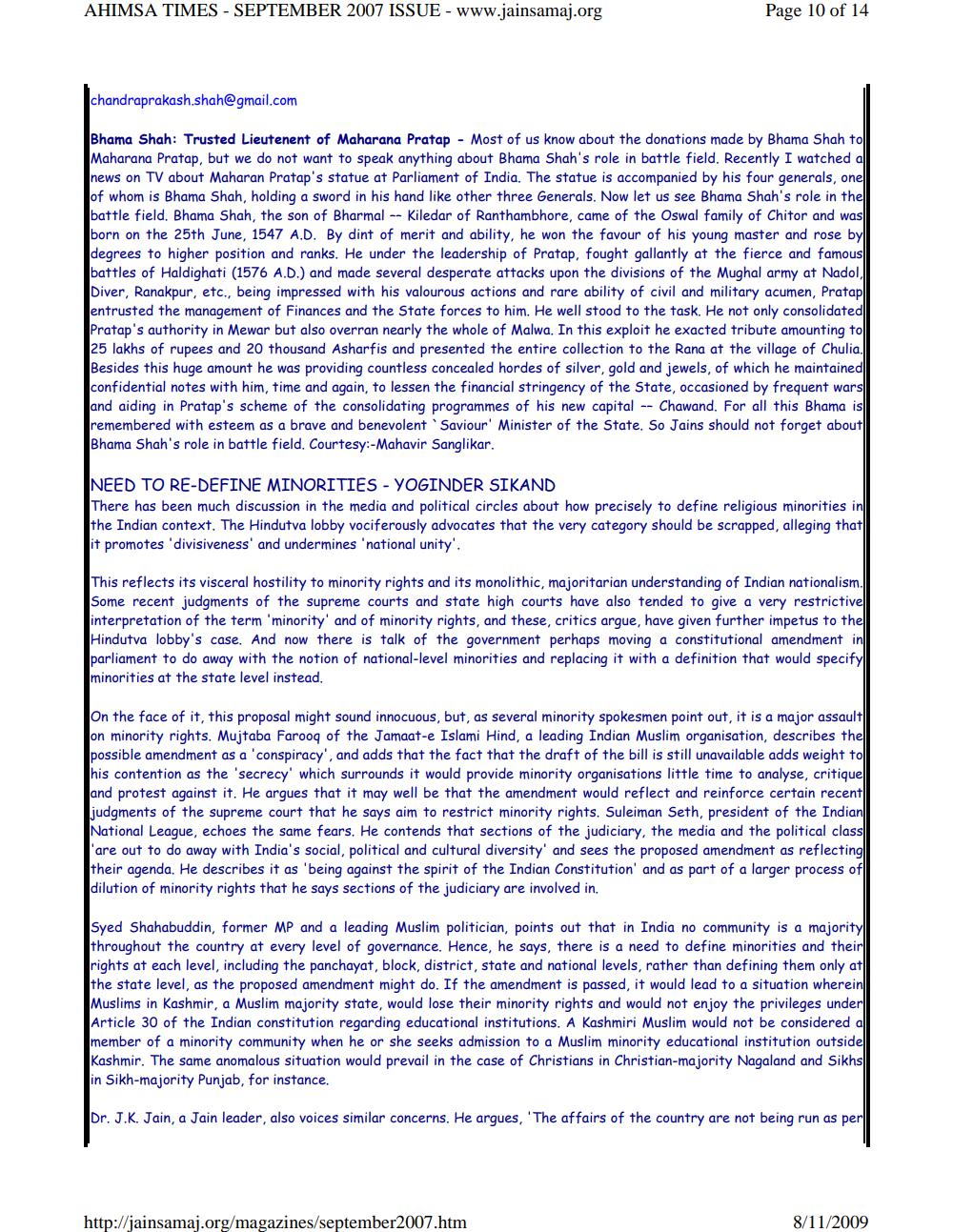________________
AHIMSA TIMES - SEPTEMBER 2007 ISSUE - www.jainsamaj.org
Page 10 of 14
chandraprakash.shah@gmail.com
Bhama Shah: Trusted Lieutenent of Maharana Pratap - Most of us know about the donations made by Bhama Shah to Maharana Pratap, but we do not want to speak anything about Bhama Shah's role in battle field. Recently I watched a news on TV about Maharan Pratap's statue at Parliament of India. The statue is accompanied by his four generals, one of whom is Bhama Shah, holding a sword in his hand like other three Generals. Now let us see Bhama Shah's role in the battle field. Bhama Shah, the son of Bharmal - Kiledar of Ranthambhore, came of the Oswal family of Chitor and was born on the 25th June, 1547 A.D. By dint of merit and ability, he won the favour of his young master and rose by degrees to higher position and ranks. He under the leadership of Pratap, fought gallantly at the fierce and famous battles of Haldighati (1576 A.D.) and made several desperate attacks upon the divisions of the Mughal army at Nadol Diver, Ranakpur, etc., being impressed with his valourous actions and rare ability of civil and military acumen, Pratap entrusted the management of Finances and the State forces to him. He well stood to the task. He not only consolidated Pratap's authority in Mewar but also overran nearly the whole of Malwa. In this exploit he exacted tribute amounting to 25 lakhs of rupees and 20 thousand Asharfis and presented the entire collection to the Rana at the village of Chulia, Besides this huge amount he was providing countless concealed hordes of silver, gold and jewels, of which he maintained confidential notes with him, time and again, to lessen the financial stringency of the State, occasioned by frequent wars and aiding in Pratap's scheme of the consolidating programmes of his new capital -- Chawand. For all this Bhama is remembered with esteem as a brave and benevolent 'Saviour' Minister of the State. So Jains should not forget about Bhama Shah's role in battle field. Courtesy:-Mahavir Sanglikar.
NEED TO RE-DEFINE MINORITIES - YOGINDER SIKAND There has been much discussion in the media and political circles about how precisely to define religious minorities in the Indian context. The Hindutva lobby vociferously advocates that the very category should be scrapped, alleging that it promotes 'divisiveness' and undermines 'national unity'.
This reflects its visceral hostility to minority rights and its monolithic, majoritarian understanding of Indian nationalism. Some recent judgments of the supreme courts and state high courts have also tended to give a very restrictive interpretation of the term 'minority' and of minority rights, and these, critics argue, have given further impetus to the Hindutva lobby's case. And now there is talk of the government perhaps moving a constitutional amendment in parliament to do away with the notion of national-level minorities and replacing it with a definition that would specify minorities at the state level instead.
On the face of it, this proposal might sound innocuous, but, as several minority spokesmen point out, it is a major assault on minority rights. Mujtaba Farooq of the Jamaat-e Islami Hind, a leading Indian Muslim organisation, describes the possible amendment as a 'conspiracy, and adds that the fact that the draft of the bill is still unavailable adds weight to his contention as the 'secrecy' which surrounds it would provide minority organisations little time to analyse, critique and protest against it. He argues that it may well be that the amendment would reflect and reinforce certain recent judgments of the supreme court that he says aim to restrict minority rights. Suleiman Seth, president of the Indian National League, echoes the same fears. He contends that sections of the judiciary, the media and the political class
are out to do away with India's social, political and cultural diversity' and sees the proposed amendment as reflecting their agenda. He describes it as 'being against the spirit of the Indian Constitution and as part of a larger process of dilution of minority rights that he says sections of the judiciary are involved in.
Syed Shahabuddin, former MP and a leading Muslim politician, points out that in India no community is a majority throughout the country at every level of governance. Hence, he says, there is a need to define minorities and their rights at each level, including the panchayat, block, district, state and national levels, rather than defining them only at the state level, as the proposed amendment might do. If the amendment is passed, it would lead to a situation wherein Muslims in Kashmir, a Muslim majority state, would lose their minority rights and would not enjoy the privileges under Article 30 of the Indian constitution regarding educational institutions. A Kashmiri Muslim would not be considered a member of a minority community when he or she seeks admission to a Muslim minority educational institution outside Kashmir. The same anomalous situation would prevail in the case of Christians in Christian-majority Nagaland and Sikhs in Sikh-majority Punjab, for instance,
Dr. J.K. Jain, a Jain leader, also voices similar concerns. He argues, 'The affairs of the country are not being run as per
http://jainsamaj.org/magazines/september 2007.htm
8/11/2009




